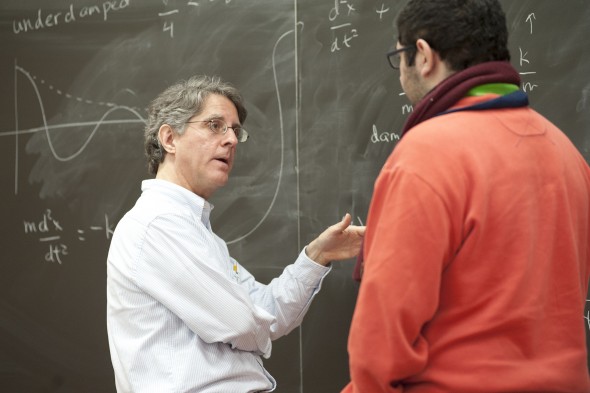Fostering fascination with ideas in physics

“When I approach a classroom, I do so based on my own experience learning physics,” says Mark Schlossman. — Photo: Roberta Dupuis-Devlin
Mark Schlossman says there’s more to teaching physics than just how to solve problems.
“I hope my students see physics as something they can engage in intellectually,” he says.
Schlossman, professor and associate head of physics, has made pivotal contributions to the teaching of physics at UIC, both in his own classroom and as a leader in overhauling the curriculum. Many of the undergraduates he teaches are physics majors; others are in engineering and some are mathematics and philosophy majors.
“When I approach a classroom, I do so based on my own experience learning physics,” he said. “What excited me were these fascinating ideas — I think it’s important that students be fascinated by ideas.”
More than 15 years ago, Schlossman completely revised the syllabus of Physics 245, the fourth in a series of introductory classes required of all physics majors and some engineering majors. He changed what had been a survey of many topics — waves, optics, fluids and thermodynamics — into an in-depth exploration of two concepts that form the foundation of much of modern physics: wave phenomena and thermal physics.
“Intro physics courses teach electromagnetism without the effect of temperature — essentially, zero-temperature physics,” Schlossman said. “Heat affects everything, but we [tend to] teach it separately.”
In addition to changing the course content, Schlossman pioneered innovative pedagogical methods and new technologies in the classroom. He introduced cooperative learning into a large introductory physics course. He adopted these methods based on then-new developments in the teaching of humanities and social sciences.
More recently, he has focused on incorporating applets, or interactive simulations, to enable “lab-at-home” experiments and deepen students’ understanding of the material.
In 2012, he became chair of the department’s educational policy committee, charged to improve the curriculum for physics majors.
“We’ve completely transformed courses at the 200 level,” he said. “We want to form the foundation for upper-level courses and problems they’ll face in their professional lives as physicists or in other fields.”
The proposed revisions now go to the senate committee on academic programming, he said.
Schlossman says he knew he wanted to be a physicist — or a musician — since junior high or high school. He earned his undergraduate degree in physics from MIT, and his master’s and Ph.D. at Cornell University. The former oboist then did postdoctoral research at Harvard University and was a research scientist at the University of Chicago’s James Franck Institute before joining the UIC faculty in 1994.
Schlossman studies condensed-matter physics, using X-ray scattering to understand what atoms, molecules and ions do at liquid surfaces, especially of water.
“Lots of things happen at the surface that are important to biology and industry,” he said. “How do ions pass through an interface, and how can we utilize that in separation and purification techniques?”
Separation is critical to supply precious materials, Schlossman noted, from rare earth elements, which are scarce due to geopolitics, or the most precious material of all, pure water. Extraction can be used to desalinize seawater or to decontaminate industrial wastewater.
“All processes take place at the interface; it’s where you pull stuff out,” he said.
He has five graduate and five undergraduate students involved in his work.
“I focus my research toward the accomplishments of my students,” he said. “I really want them to make the progress in my research and play a central role.”
